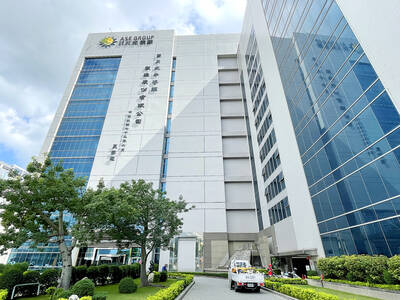On speculation that last week’s talks between Taiwan and China would pave the way for cross-strait banking ties, the main bourse’s finance and insurance sub-index rallied 15.44 percent last week, compared with a decline of 2.64 percent on the benchmark TAIEX.
But the euphoria may have been driven by the stocks’ rather low valuations compared with their Asian peers, analysts said, meaning the gains could be short-lived and investors should be cautious.
“We recommend profit-taking on the recent rally of stocks” driven by the cross-strait talks, Daniel Chang (張博淇), head of equity research at Macquarie Securities Ltd’s Taiwan branch, said in a research note released on Friday.
“We believe that the prospective benefits” of buying right now “are either too distant in the future or too minor and current macroeconomic headwinds will be the primary factor influencing earnings and share prices in the medium term,” Chang said.
Financial stocks have suffered a sell-off most of the year on concerns of global liquidity amid the credit crisis. As of Oct. 31, the finance and insurance sub-index had plunged 43.25 percent for the year, compared with a fall of 42.74 percent on the TAIEX, the stock exchange’s tallies showed.
Investors’ tastes for financial stocks last week, however, rode on the back of expectations that Taiwan and China might sign a memorandum of understanding (MOU) on cross-strait banking regulation by the spring, as suggested by Straits Exchange Foundation Vice Chairman Kao Koong-lian (高孔廉) on Tuesday, allowing local lenders to gain access to the Chinese market and serve Taiwanese businesspeople there.
Chinatrust Financial Holding Co’s (中信金控) shares jumped 18.11 percent last week, followed by First Financial Holding Co’s (第一金控) 14.47 percent increase and Mega Financial Holding Co’s (兆豐金控) 9.84 percent rise. Stocks of Taishin Financial Holding Co (台新金控) were up 6.88 percent and Cathay Financial Holding Co (國泰金控) up 6.81 percent.
Brokerage stocks also caught investors’ attention last week on news that the regulator planned to let qualified domestic institutional investors (QDII) in China invest in Taiwan’s financial markets.
SinoPac Securities Corp (永豐金證券) projected NT$37 billion (US$1.1 billion) in inflows into the domestic financial market following proposed amendments to QDII regulations that would lead local brokerages to launch QDII funds.
Shares of Masterlink Securities Corp (元富證券) rose 7.04 percent last week and Yuanta Financial Holding Co (元大金控), which owns the nation’s largest brokerage, Yuanta Securities Corp (元大證券), saw its shares rise 7.42 percent.
Chang said he didn’t expect a cross-strait MOU before the first half of next year and believed it would take years before local banks would see significant benefits.
But perhaps the biggest factor weighing down market sentiment is whether the global credit crisis will begin to subside.
“We expect more downside [pressure] on local stock prices given the weakening macroeconomic environment and rising credit risks,” Chang said.
Citigroup Global Markets sees local banks’ exposure to US subprime-related investments and the deterioration of credit quality in their customers as continuing risks for investors, Citigroup analyst Braford Ti (鄭溫煌) said.
After a trip to the US to meet clients, Ti said in a report on Friday that many US investors recognized the low valuations of Taiwanese banks and the bargain-hunting opportunity this posed.
He suggested buying shares of the “best franchises,” especially large institutions and those with few family-owned stakes.
“Although stocks were sold indiscriminately on the way down, we expect investors to be more discerning on the way up,” Ti wrote, adding that Citigroup favors First Financial Holding Co (第一金控), Chinatrust Financial and Yuanta Financial.
By comparison, Macquarie is pessimistic about shares of Chinatrust Financial, Mega Financial and Taishin Financial.

EXPANSION: The investment came as ASE in July told investors it would accelerate capacity growth to mitigate supply issues, and would boost spending by 16 percent ASE Technology Holding Co (ASE, 日月光投控), the world’s biggest chip assembly and testing service provider, yesterday said it is investing NT$17.6 billion (US$578.6 million) to build a new advanced chip packaging facility in Kaohsiung to cope with fast-growing demand from artificial intelligence (AI), high-performance-computing (HPC) and automotive applications. The new fab, called K18B, is to commence operation in the first quarter of 2028, offering chip-on-wafer-on-substrate (CoWoS) chip packaging and final testing services, ASE said in a statement. The fab is to create 2,000 new jobs upon its completion, ASE said. A wide spectrum of system-level chip packaging technologies would be available at

Taiwan’s foreign exchange reserves hit a record high at the end of last month, surpassing the US$600 billion mark for the first time, the central bank said yesterday. Last month, the country’s foreign exchange reserves rose US$5.51 billion from a month earlier to reach US$602.94 billion due to an increase in returns from the central bank’s portfolio management, the movement of other foreign currencies in the portfolio against the US dollar and the bank’s efforts to smooth the volatility of the New Taiwan dollar. Department of Foreign Exchange Director-General Eugene Tsai (蔡炯民)said a rate cut cycle launched by the US Federal Reserve

HEAVYWEIGHT: The TAIEX ended up 382.67 points, with about 280 of those points contributed by TSMC shares alone, which rose 2.56 percent to close at NT$1,400 Shares in Taiwan broke records at the end of yesterday’s session after contract chipmaker Taiwan Semiconductor Manufacturing Co (TSMC, 台積電) hit a fresh closing-high amid enthusiasm toward artificial intelligence (AI) development, dealers said. The TAIEX ended up 382.67 points, or 1.45 percent, at the day’s high of 26,761.06. Turnover totaled NT$463.09 billion (US$15.22 billion). “The local main board has repeatedly hit new closing highs in the past few sessions as investors continued to embrace high hopes about AI applications, taking cues from a strong showing in shares of US-based AI chip designer Nvidia Corp,” Hua Nan Securities Co (華南永昌證券) analyst Kevin Su

Nvidia Corp’s major server production partner Hon Hai Precision Industry Co (鴻海精密) reported 10.99 percent year-on-year growth in quarterly sales, signaling healthy demand for artificial intelligence (AI) infrastructure. Revenue totaled NT$2.06 trillion (US$67.72 billion) in the last quarter, in line with analysts’ projections, a company statement said. On a quarterly basis, revenue was up 14.47 percent. Hon Hai’s businesses cover four primary product segments: cloud and networking, smart consumer electronics, computing, and components and other products. Last quarter, “cloud and networking products delivered strong growth, components and other products demonstrated significant growth, while smart consumer electronics and computing products slightly declined,” compared with the